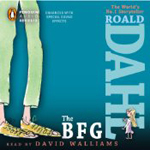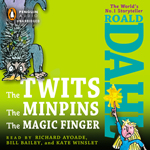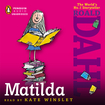
 Boy: Tales of Childhood
Boy: Tales of Childhood
By Roald Dahl; Read by Dan Stevens
Penguin Audio
[UNABRIDGED] – 3 hours, 11 minutes
Publisher summary:
Where did Roald Dahl get all of his wonderful ideas for stories?
From his own life, of course! As full of excitement and the unexpected as his world-famous, best-selling books, Roald Dahl’s tales of his own childhood are completely fascinating and fiendishly funny. Did you know that Roald Dahl nearly lost his nose in a car accident? Or that he was once a chocolate candy tester for Cadbury’s? Have you heard about his involvement in the Great Mouse Plot of 1924? If not, you don’t yet know all there is to know about Roald Dahl. Sure to captivate and delight you, the boyhood antics of this master storyteller are not to be missed!
At the start of his book, Roald Dahl says, “An autobiography is a book a person writes about his own life, and it usually filled with all sorts of boring details. This is not an autobiography.”
Rather than a straight autobiography, it’s a short collection of some of his most powerful memories of childhood – the good, the scary, the hilarious and mischievous — all revealed with his amazing ability to paint a scene with the most evocative details and to find humor in even the worst situations.
Roald Dahl knows just the right details to capture your imagination and take you back to that feeling of being a kid, when the world is magical and mysterious and kinda gross, and Dan Stevens does a great job of narrating these tales with an engaging, slightly amused tone. Even readers who don’t know Roald Dahl’s books (they do exist: I know one!) would probably enjoy this book just for the trip back to a child’s perspective.
For fans, though, the collection is even more special, because it’s like taking a tour through Roald Dahl’s mind. Although Dahl rarely mentions it, if you know his work you’ll see the inspirations for his later stories and characters all through these anecdotes.
The most obvious one is in his near-religious awe of the candy shop. It promises so much and is so filled with delights, but the woman who works there is frightening and Roald Dahl in his friends come up with all kinds of conspiracy theories about the seeming-magic of some of the candy: for example, they are convinced the licorice shoelaces are made of rat’s blood, and the ‘tonsil ticklers’ candies are saturated with anesthetic to subdue children.
Then there is Mr. Cadbury, who regularly sent Roald Dahl’s family boxes of unidentified new flavors chocolates to taste-test. It’s not hard to see the seeds for Charlie and the Chocolate Factory when you hear Roald Dahl’s childhood revelation that, somewhere, there are people working away in inventing rooms to come up with new and amazing flavors of chocolate.
Along with all the more colorful and whimsical stuff are the darker stories of his boyhood, like having doctors turn up with their surgical bags and chloroform to operate right there in the living room, and many awful dealings with bullies of all sizes – but even the most horrid character becomes someone to delight in because of Roald Dahl’s cheerful wit and playful descriptive detail. You’re right there with him when the sheer force of the “foul and beastly” matron’s voice causes that “massive bosom of hers to quiver like a blancmange.”
Posted by Marissa van Uden
 The BFG
The BFG The Twits, The Minpins, & The Magic Finger
The Twits, The Minpins, & The Magic Finger Matilda
Matilda The Wonderful Story of Henry Sugar and Six More
The Wonderful Story of Henry Sugar and Six More

